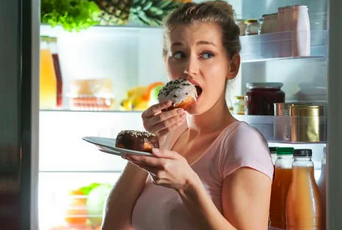Snacking is a major issue that leads to excessive weight gain. Many customers come to me who eat healthily at mealtimes but then undo all their hard work by snacking in between meals and after dinner. Learn expert strategies on how to stop snacking and achieve wellness goals effortlessly. Master cravings and regain control over your eating habits today!”
Snacking when bored, stressed, or at night while watching TV all result in additional calories and unnecessary weight gain. So, if you’re seeking help on how to quit snacking, you’ve come to the right place. I recommend reading this article, in which I’ll address the three most common snacking difficulties that people bring to me in my hypnosis practice.
1. How to Stop Snacking When Stressed
Snacking while anxious is extremely prevalent. What’s better to distract yourself from life’s difficulties by eating some comfortable ice cream or a whole family bag of crisps? I understand the thinking behind it, but the truth is that food is not here to relieve emotion. Food is for fuel, not to forget about the disagreement at work. In fact, cramming your face with undesired calories gets you no closer to resolving the workplace conflict and instead exacerbates it by causing extra weight gain, mood fluctuations, and emotions of remorse and guilt after the eating is over and you feel bloated.
My recommendation for how to avoid snacking when anxious is to engage in another activity that calms your nervous system. For example, taking a walk outside, being in nature, taking a relaxing bath, receiving a massage, practicing meditation, engaging in stress-relieving exercise, or listening to relaxing hypnosis recordings. If you need inspiration, check out my YouTube channel, Alex Saxton Hypnotherapy, for calming hypnosis videos that can help you relax and release your anxieties.
When you begin to substitute snacking with calming activities when stressed and continue to do so, the impulse to eat will gradually be replaced by more healthful activities that not only quiet your nervous system but also prevent unwanted additional weight and feelings of guilt.
2. How to Stop Snacking When Bored
Whether you know it or not, boredom is an emotion. It basically means you aren’t mentally satisfied. So when boredom hits, it’s time to engage in intriguing activities, employment, or hobbies, rather than chocolate biscuits!
This is where I ask my customers whether they have ever wanted to start a hobby, course, or project but have never had the time. Because if there is, it is exactly what your brain has been crying out for. Something to stimulate the brain and allow it to learn new information. The brain naturally rewards you with a dopamine hit when you learn new things, therefore if I were you, I would obtain the dopamine hit from learning something that will lead to advancement in a profession or pastime, rather than the dopamine hit from consuming too many calories will cause waistline expansion!
If there isn’t a course to take or work to be done, you can keep your mind busy with crosswords, jigsaw puzzles, knitting, stretching, yoga, mindful colouring, decluttering around the house, cleaning, and sudoku. I mean, the list is limitless. So, the next time you have a want for a snack, consider what emotion it is, and if it is boredom, stimulate your mind with other activities that will not cause weight gain.
3. How to Stop Snacking at Night while watching the TV
Snacking at night is extremely common. During the day, folks are usually significantly occupied with work, gym, or school runs, for example. But at night, most individuals prefer to unwind in front of the television with their favourite food.
Now, just because you’re watching television doesn’t mean you have to eat at the same time. This is when my clients say, “If I don’t eat while watching TV, it feels odd like something is missing.” This is because they have repeatedly chosen to eat snacks at night in front of the television, and as a result, they have developed what is known as a habit. According to the Oxford Dictionary, this is “a settled or regular tendency or practice, especially one that is hard to give up.”
That’s why people find it difficult to stop munching at night because they consciously want to stop snacking, but as it’s an ingrained habit, therefore they’ll need a lot of determination and willpower to overcome a habit carried out by the subconscious mind.
But don’t worry, there are ways to break an undesired habit; all you need is time and commitment. For example, rather than eating in front of the TV, perform another food-free activity instead; for ideas, see the activities described under “How to Stop Snacking when Bored” After an average of 66 days or less of completing a food-free activity in front of the TV, you will notice that the temptation to nibble diminishes and eventually disappears. Well done, you’ve broken the habit!
Last words…
If you are struggling with unwanted snacking when stressed or bored or struggle to break the habit of snacking at night in front of the TV, I recommend you get in touch with me to hear about my hypnosis services designed to help you overcome the unwanted snacking behaviour in a short a time frame as possible – without having to rely on will power alone.
If you want to learn more, check out my “Say Goodbye to Emotional Eating” hypnotherapy service, where I can help you eradicate harmful snacking behaviours and build healthier eating habits. To learn more, follow this link – Hypnosis for Weight Loss and Emotional Eating
I am a clinical hypnotherapist with over 15 years of expertise, and so far, I have assisted over 100 people from Poole, Bournemouth, Southampton, Bath, London, Bristol, the United States, and even New Zealand. Regardless of where you live, I am completely qualified to serve you in the same manner, so do contact me if you require my hypnosis services as well. Here’s the connection to my
website, www.alexsaxton.com , and here’s the link to my calendar, wwww.alexsaxtoncalendar.as.me, if you would like to book a free consultation with me.




